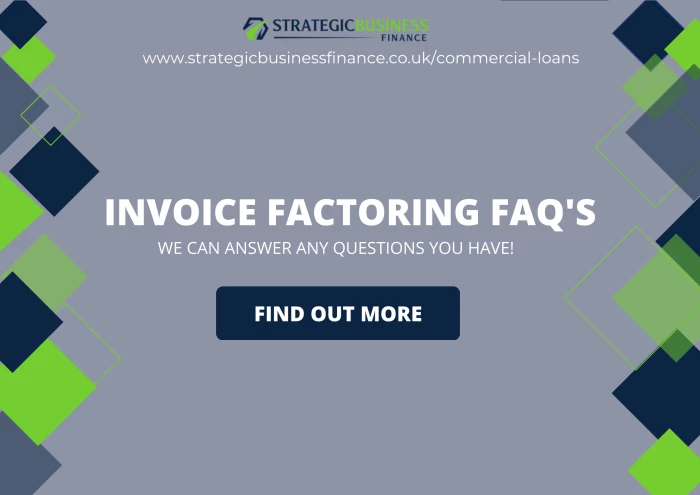
Invoice Factoring
Get in touchIf you are looking for an invoice factoring company in the UK, then you have come to the right place! We are experts in this industry and are here to help with any queries you might have.
Small businesses are often in need of more than a helping hand to get by in today's financial climate, and one of the more popular and reliable ways to access funding at short notice is through invoice factoring providers.
Invoice finance effectively allows you to share financial information and invoices with a third party so that you don't have to chase up any payments from money owed to your business from clients.
It is a particularly attractive option for young businesses and firms who may be in need of working capital, cash flow and payment for services immediately as opposed to later on down the line.
There is more to invoice funding than simply sharing outstanding invoices to a factoring company or selling invoices.
This is why our team have put together this handy introduction and guide so that you consider the option for yourself, and whether or not it is viable for your particular business and your own set of circumstances.
What is Invoice Factoring?
Invoice factoring or accounts receivable financing allows you to sell your business invoices to a specialist at a cut rate.
A debt factoring company will be able to advance you 80%-90% of monies due upfront and before you are expected to eventually be paid.
Many invoices will have set payment terms attached to them, this could mean that your company is not paid until 30 days or 90 days of the services or works being completed for small businesses.
This might be a problem, as they might not have the cash flow or access to cash.
.png)
There are different types of invoice factoring services available, such as recourse factoring and non-recourse factoring.
Invoice financing is not needed for every invoice value, it might just be for a single invoice and this is called spot factoring or selective factoring.
Recourse VS Non-recourse
Recourse factoring means that if the customer doesn't pay, it is your responsibility to cover the costs of the unrecoverable invoices.
Non-recourse factoring means that the finance provider takes the credit risks and the factoring company collects and chases the client for the outstanding invoice payment.
It is their responsibility to cover the remaining balance and make sure the customers pay.
Whether you decide on a recourse or non-recourse factoring will be entirely dependent on the relationship between the customer and the lender, and how likely repayment is.
There are credit controllers who will help ensure you can make repayments. It is still worth evaluating whether low-cost recourse facilities are worth the risk.
How Does Invoice Factoring Work?
Many customers ask us - how does factoring work?
The factoring process is as follows:
Your company will continue to provide goods or services to customers.
You will invoice the customer for your services.
Then you will sell the outstanding invoices to a factoring company. The factoring company will pay you the majority of the invoiced amount straight away.
Your customers will pay the factoring company direct.
Once the factoring company have received the payment from your customer, they will pay you the remaining invoice amount but take off their service fee.
We offer you a certain percentage of the money you are owed by customers or debtors, and we then collect the remainder, and a small fee, when the bill comes due and is paid.
Consider the process to work along the lines of cash advances in confidence. You will supply us with unpaid invoices and data to set up invoice finance, and we will then be able to offer you a deal.
A debt factoring company will manage your own credit control, and sales ledger and collect unpaid invoices and payments from your customers.
It is worth bearing in mind that once a customer or client does eventually pay, any factoring company you sign up for factoring with will collect the debt and release your remaining funds, minus a service fee.
How Much Does Factoring Invoices Cost?
The cost of factoring invoices varies depending on a number of factors, such as:
The industry.
Size of the business.
The creditworthiness of the customers listed on the invoices.
The volume of invoices.
Length of the factoring agreement.
Invoice factoring costs will come into the equation if you are considering setting up this type of contract.
.png)
Factoring companies charge a fee for their service s which is usually a percentage of the invoice amount. This fee is also known as a discount rate and can range from 1% - 5% per month, depending on the above factors.
Some companies will charge additional service fees for setting up the agreement, the administration fee, credit checks, collections and legal services.
Make sure you do your research before choosing a https://www.strategicbusinessfinance.co.uk/[location_link] and selecting business loans, as you need to make sure you are choosing the correct company to work with your business.
Invoice Factoring Company the UK
There are many different invoice finance services set up in the UK right now and we are some of the most competitive local experts for a number of nearby firms and businesses looking to gain access to instant funds and allowances at short notice.
Here are a few things to bear in mind when comparing each invoice factoring facility:
Are they a member of the Asset Based Finance Association?
Are their reviews and testimonials good?
What are their overall fees?
To what extent are their deadlines for money owed flexible?
We aim to get to know each and every one of the businesses that request our support as closely as possible, so that we can easily find out whether or not a factoring company is a worthwhile process for you to enter into.
As the closest experts in simple commercial finance many firms and traders have in our local and surrounding areas, we're proud to be able to offer an honest, and straightforward invoice factoring service from advice through to physical lending.
There is a range of other things you will need to think about during strategic business finance, including https://www.strategicbusinessfinance.co.uk/asset-finance/ so if you would like to speak to our team, please complete our contact form.
Is Invoice Factoring a Good Option For Small Businesses?
Invoice factoring can be a great option for small businesses, especially those who have difficulty obtaining traditional bank loans and need funds quickly.
There are a number of great reasons why small businesses should look into invoice factoring.
Here are just a few of the big positives you could be considering when you look into this type of finance:
You'll be able to get hold of unpaid cash instantly.
You'll simply have to pay a small fee on the balance when bills eventually get paid.
You won't even need to consult customers for finance yourself, as credit control service can be made available.
You won't get access to 100% of the money right away, but with a majority of up to 90% available to you for the invoice amount, you will still be able to make moves financially that you otherwise couldn't if you were waiting for payments or chasing late payments.
Therefore, this type of finance may not be worthwhile if you can comfortably continue without a cash injection or upfront cash transferrable.
It is a great option for new businesses to consider if they are just getting started, due to the positive cash flow available.
It's worthwhile speaking to local finance experts and lenders as to whether or not factoring is appropriate for your needs and financial situation.
Best Invoice Factoring Companies
If you are searching for the best invoice factoring businesses in the UK, you will find a lot of businesses offering accounts receivable financing services.
We advise that you look into the factoring company thoroughly to check their credentials, reviews and services.
.png)
We're proud to be able to continue supporting some of the most competitive rates of lending around.
We strongly encourage you to come and speak to our team for free before you consider looking at other avenues of https://www.strategicbusinessfinance.co.uk/commercial-loans/ which may or may not be beneficial to you.
Compare Invoice Factoring
It's always a good idea to compare invoice financing and the various firms and deals, we recommend you do so.
Some firms may offer different rates of fees and may even vary in terms of rates of invoice funding made available to you ahead of time.
Always remember to check the service, price and flexibility!
These are obviously going to be the two main factors you will likely want to consider when you first look into invoice finance, meaning that it's the two main factors we lead with when opening discussions with potential clients.
We see no point in keeping you in the dark, let's find you practical, worthwhile and local dealers to help you gain access to funding as and when you need it, not when your customers are physically able to pay it.
What are the Advantages of Invoice Factoring?
Invoice factoring offers a variety of benefits for businesses, including:
Improved Cash Flow - Factoring can help businesses manage their cash flow better. Having cash flow allows some companies to grow their business quickly but also helps companies who might be facing cash flow or credit control troubles.
Immediate Cash - Factoring is a quick way for businesses to get funds which can cover a range of expenses, including payroll, inventory and operating costs.
Credit Risk Management - Factoring companies manage the credit risk of the customers on the invoices.
Less Restrictive - It can be less restrictive than other forms of finance, such as a bank loan, small business loans or overdrafts.
Administrative Relief - Invoice factors will manage the whole invoice process, entire sales ledger, credit control and debt collection.
Flexibility - Factoring allows businesses to get financing based on their current sales, rather than their previous performance.
What are the Disadvantages of Invoice Factoring?
Invoice factoring is not suitable for every company and before choosing this finance option, it is worth knowing the disadvantages.
Please see the disadvantages which we have listed below:
Cost - Factoring can be more expensive than other forms of financing.
Customer Relationships - Factoring companies manage the responsibilities of collecting payments from customers and this can affect customer relationships if it is not handled correctly.
Commitment - most factoring companies will want to deal with the majority of accounts receivable. Some companies will do selective factoring or spot factoring.
Reputation - some clients might think your company is not established enough to deal with your own credit control.
Invoice Factoring Rates
For more information on invoice financing rates, fees and other potential expenses, we always recommend you consult us first.
We may be able to set up a fantastic tailored deal for you that you haven't been able to compare against elsewhere.
We'll set you up with a free consultation as soon as is convenient for you to get started.
Frequently Asked Questions
What is the Difference Between Invoice Financing and Factoring?
Invoice financing is a general term which refers to any financial product that allows a business to borrow money using its unpaid invoices as collateral.
Factoring refers to the process of selling unpaid invoices to a factoring company which then collects payment from customers listed on the invoices.
What is the Difference Between Invoice Discounting and Invoice Factoring?
The difference between invoice discounting and factoring is that with invoice discounting, the business is responsible for collecting payment from the customers.
Invoice factoring involves selling outstanding invoices to a factoring company and the factoring company will collect payment from the customers.

Is Invoice Factoring Regulated in the UK?
No, factoring is not regulated in the UK or by the Financial Conduct Authority (FCA).
This means you won't always get the consumer protections you would expect to receive.
The Asset Based Finance Association, or ABFA, is an association that has a code of conduct that factoring companies must abide by if they are members.
ABFA provides access to an independent Ombudsman for dissatisfied customers to make their complaints.
Other institutions for finance, such as banks, are required to follow a general ethical code that ensures they treat customers fairly.
We will always put the customer first and ensure that the entire process is ethical and fair.
What is a Factoring Company?
A factoring company is a financial institution that provides funding to businesses by purchasing their invoices at a discount.
A factoring company buys companies unpaid invoices for a factoring fee. The factoring fee will be deducted once the invoice payment has been collected from the customer.
What is Spot Factoring?
Spot factoring is a type of financing where a company sells individual invoices or small invoices to a factoring company at a discount.
The spot factoring company will then collect payment from the customer listed on the invoice.
What is Selective Invoice Discounting?
Selective invoice discounting is a type of invoice financing where a business chooses which invoices to sell to a financing company.
This type of financing allows businesses to have more control over cash flow and client relationships.
It is a flexible and confidential way of obtaining short-term funding and if often used by businesses with good creditworthiness and a steady cash flow but need additional funding to help with growth or unexpected expenses.
Other Services We Offer
Asset Finance - https://www.strategicbusinessfinance.co.uk/asset-finance/
Commercial Business Loans - https://www.strategicbusinessfinance.co.uk/commercial-loans/
Bridging Finance - https://www.strategicbusinessfinance.co.uk/bridging-finance/
Contact Us
Need help with invoice finance and looking for assistance? Keen to get advances on bill payments and are worried about not getting paid in time?
Consult our team to learn more about factoring and invoice discounting and set up a free consultation. Just contact us via our web form today.
Get in touch
Skip to
Gallery











